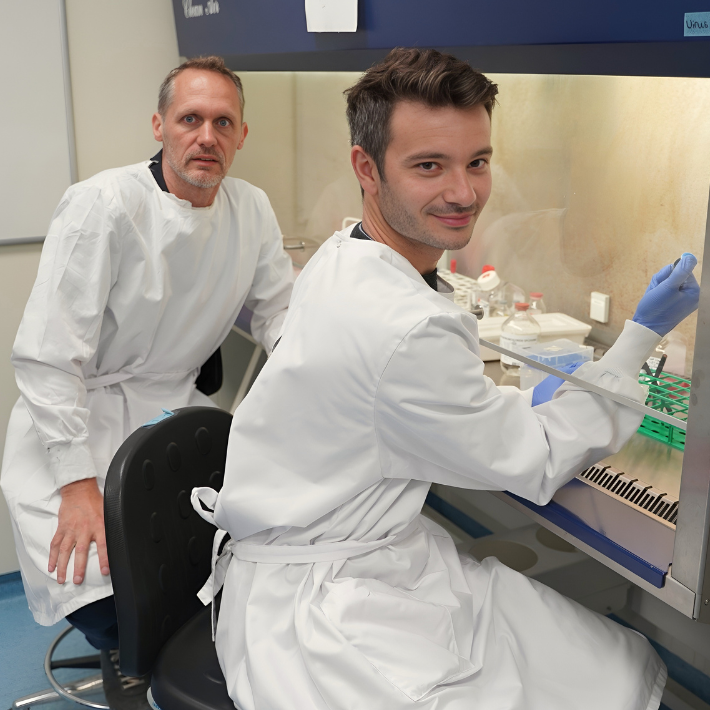New solution found for CMV (and potentially other chronic viruses and cancer)
Researchers Ramon Arens and Nils Mülling.
&width=710&height=710)
CMV is a herpes virus that almost everyone comes across during life. After infection, CMV, as with other herpes viruses, remains latent in the body. It usually does not cause any symptoms. But in people with weakened immune systems, the disease can recur repeatedly, such as in kidney transplant patients. This is as a result of the drugs they are given to prevent the body from rejecting the donor kidney. So-called CMV reactivation can lead to serious health problems, such as inflammation of the colon, eyes and lungs.
Antiviral drugs do not help
Principal investigator Nils Mülling is affiliated with the LUMC and the University Medical Center Essen in Germany. In Essen, he worked with kidney transplant patients who were unable to control CMV infections. Despite the use of antiviral drugs, the virus kept reappearing. Mülling: “Why does the immune system of these patients fail to control the virus? What is the mechanism behind this? And how can we better protect those patients from CMV?” To find answers to those questions, he approached LUMC immunologist Ramon Arens, who was experienced in fundamental research on CMV, to collaborate.
Cells get exhausted
Together, the scientists studied (CMV-specific) T cells, white blood cells that play an important role in the immune system and protect people from infections. In doing so, they looked specifically at the role of CD8+ T cells, also called killer T cells. These ensure that cells infected by viruses or that are cancerous are cleared.
An important role in this is provided by a protein called CD38, which is found on the external surface of CD8+ T cells. CD38 causes the CD8+ T cell to act against the infection. At the same time, the protein also takes care of the energy balance in the cell so that it has enough energy to respond effectively to the infection. At least, in healthy people this is how it proceeds. Arens: “But in our patients, the CMV infection keeps returning. The CD8+ T cells have to respond to it over and over again, causing CD38 to go into overdrive. As a result, the CD8+ T cells become exhausted and are no longer able to control the virus. The infection then becomes chronic.”
Inhibiting CD38
In the laboratory, the scientists succeeded in inhibiting CD38. This restored the energy balance in the CD8+ T cells, allowing them to fight the virus more effectively. To do this, they used a compound that had previously been tested in anti-aging studies, where inhibition of CD38 led to mice living longer.
Chronic viruses and cancer
According to Arens and Mülling, their discovery offers hope not only to kidney transplant patients with CMV, but also to recipients of other organs who carry the virus. The results also offer leads for other chronic viruses, such as HIV and hepatitis B, they argue. Furthermore, the CD38 inhibitor also has potential as a new form of immunotherapy against cancer, Mülling believes. “After all, the T cells fighting the tumor may suffer the same fate as we have found with CMV. A CD38 inhibitor could therefore also boost these T cells.”
Fundamental research succeeded
The new study has been published in the scientific journal The Journal of Clinical Investigation. According to the two, it is now up to other clinical researchers or companies to demonstrate the effect of the compound in large clinical studies before a treatment can be developed. As far as Arens is concerned, this study has succeeded either way. Summarizing, he says, “We had a practical problem from the clinic, found the cause ánd came up with a solution.”